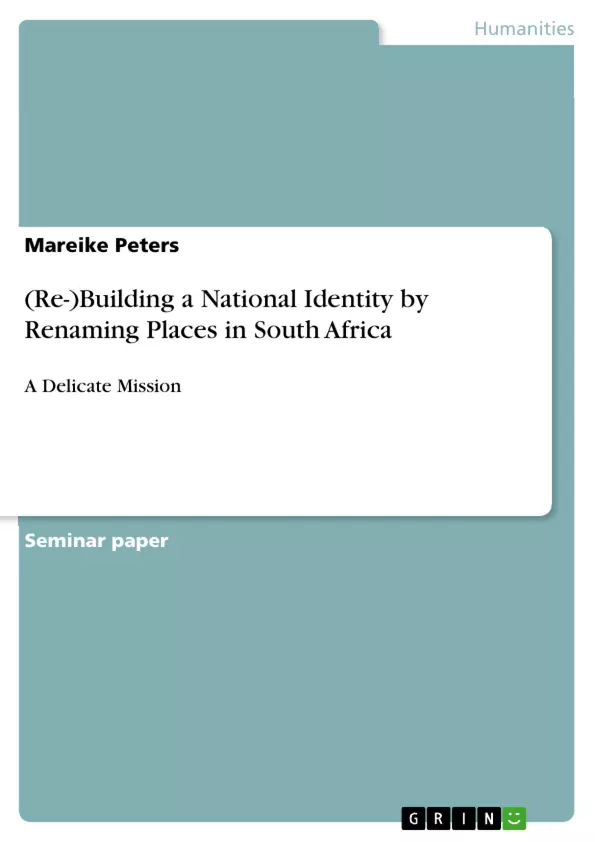Identity is one of the basic needs of a human being, a community and even a nation. It defines who we are. Identity is formed through different aspects, such as history, culture, religion or language. During the apartheid rule in South Africa, the white minority devalued the identity of the black majority population by declaring every non-white citizen a second or third class human being. After the fall of the apartheid regime in 1994, the concept of separating different ethnic groups was diminished. The “Rainbow Nation” as a synonym for a peaceful and multi-cultural society emerged. Currently, South Africa tries to construct a common post-apartheid identity, which focuses on unity rather than segregation. Place names are an important element in the building of an identity, because they give a sense of belonging to the inhabitants. In South Africa, many place names reflect the apartheid history and are seen as a symbol of segregation (further details in chapter 4). In 1998, the government passed the South African Geographical Names Council Act, which was the starting point of the renaming process.
This paper will examine the renaming process in the post-apartheid South Africa. It will focus on the importance of geographical names for the identity building. Due to the different ethnic groups living in the country, South Africa proves to be a good example of the struggle of uniting different cultures and heritages, which still plays an important role. This paper will discuss if the change of place names contributes to the formation of an all-encompassing South African identity.
Inhaltsverzeichnis (Table of Contents)
- Introduction
- Geographical Naming and Renaming
- Identity Concept
- Theoretical Framework – an Overview
- The South African Identity?
- Renaming Places in South Africa
- Renaming as Part of the Reconciliation Process
- Renaming of Pretoria
- Conflicts over Place Name Changes
- Conclusion
Zielsetzung und Themenschwerpunkte (Objectives and Key Themes)
This paper aims to analyze the renaming process in post-apartheid South Africa, focusing on the significance of geographical names in identity building. Given the country's diverse ethnic groups, South Africa serves as a compelling example of the ongoing struggle to unite different cultures and heritages. The paper explores whether the change of place names contributes to the formation of a unified South African identity.
- The role of geographical names in identity formation
- The complexities of identity construction in a diverse society
- The potential of renaming as a tool for reconciliation and nation-building
- The challenges and controversies surrounding renaming initiatives
- The impact of renaming on social cohesion and cultural identity
Zusammenfassung der Kapitel (Chapter Summaries)
- Introduction: This chapter introduces the concept of identity as a fundamental need for individuals, communities, and nations, highlighting its role in defining who we are. It outlines the historical context of South Africa, particularly the apartheid regime and its impact on identity, and the subsequent efforts to build a unified post-apartheid identity. The chapter establishes the significance of place names in identity construction and the government's renaming initiatives.
- Geographical Naming and Renaming: This chapter discusses the importance of place names in reflecting culture, heritage, and history. It emphasizes the often-overlooked role of place names in daily life and their contribution to a sense of belonging. The chapter explores the relationship between naming and political power, citing examples of colonial renaming practices and the significance of naming as a marker of political dominance.
- Identity Concept: This chapter delves into the theoretical framework of identity, examining its social and psychological dimensions. It distinguishes between individual and social identity, outlining the processes of social identity formation and the impact of societal structures and norms. The chapter explores the complexities of national identity, particularly in the context of South Africa's diverse cultural and ethnic landscape.
Schlüsselwörter (Keywords)
The primary keywords and focus topics of this paper include: geographical naming, renaming, identity, national identity, post-apartheid South Africa, reconciliation, cultural diversity, ethnic groups, place names, social cohesion, political power, and the South African Geographical Names Council Act.
Frequently Asked Questions
Why is South Africa renaming geographical places?
Renaming is a key part of the reconciliation process to remove symbols of the apartheid era and build a unified national identity that reflects the country's diversity.
What is the "Rainbow Nation" concept?
It is a term coined to describe the post-apartheid ideal of a peaceful, multi-cultural society where all ethnic groups coexist in unity.
What was the South African Geographical Names Council Act of 1998?
This Act established the legal framework and the council responsible for managing the process of naming and renaming geographical features in South Africa.
Why are place names important for identity?
Place names provide a sense of belonging and reflect the culture, history, and heritage of the people living in those areas.
What controversies exist regarding renaming, such as in Pretoria?
Renaming often leads to conflicts between different ethnic groups who feel their specific heritage is being erased or overshadowed by the new names.
- Quote paper
- MA Mareike Peters (Author), 2016, (Re-)Building a National Identity by Renaming Places in South Africa, Munich, GRIN Verlag, https://www.grin.com/document/592930



